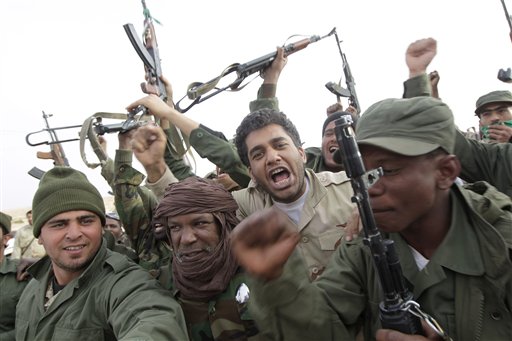TOBRUK, Libya (AP) — Libyan rebels shot down at least two bomber planes that attacked the airport in their main stronghold on Thursday, according to residents who witnessed the rare success in the struggle against Moammar Gadhafi’s superior air power.
The rebels used three of their own seized planes and some helicopters to attack government troops fighting to advance on the city of Benghazi, said Mustafa Gheriani, a spokesman in the rebel base.
A hundred miles south of Benghazi, the two sides battled for control of Ajdabiya, the last major city on the road along the Mediterranean coast.
Gadhafi’s forces have surrounded Ajdabiya and seized positions on all sides of the opposition, which has been hoping for help from the U.N. Security Council before government troops move in.
A senior hospital official told The Associated Press that 30 people had been killed and at least 80 wounded in fighting in and around Ajdabiya since Tuesday night. Many more of the injured couldn’t reach the hospital, according to the official there, who spoke on condition of anonymity for fear of official retaliation.
Gadhafi’s rapid advance on the rebels appears to have spurred the United States to leave behind weeks of doubts about a no-fly zone in Libya, and start advocating for broader U.N. authorization for international air, sea and land forces.
The Obama administration and other supporters of action against Gadhafi were pushing for a Thursday vote on a draft resolution. Russia and China have expressed doubts about the U.N. and other outside powers getting involved.
Two government planes struck Benina, a civil and military airport just outside Benghazi around 2 p.m., causing light damage before at least one was shot down by rebel anti-aircraft fire, said Mohammed Abdel-Rahman, a 42-year-old merchant who lives nearby and saw the attack.
Medical official Qassem al-Shibli told The Associated Press that he saw three planes attack the airport and nearby rebel military camps before two were shot down.
The attack may have been sparked by rebel successes in the use of air power. Opposition spokesman Mustafa Gheriani said the rebels had three planes that they’ve been using to hit Gadhafi’s forces, along with helicopters patrolling the coast.
The rebels launched airstrikes against Gadhafi’s troops on Thursday about 10 miles from the western gate of Ajdabiya, activist Abdel-Bari Zewi told the AP.
But by Thursday afternoon, Gadhafi’s army had were on the southern, eastern and western outskirts of Ajdabiya and had seized the nearby port town of Zwitina to the north, encircling the city.
“Gadhafi troops have not invaded the city on foot until now,” said Moataz al-Gheriani, who lives in downtown Ajdabiya and is in touch with the rebels. “They are only imposing a siege from three fronts: the western, the southern and the eastern. No one can leave and no one can enter.”
Zewi said that a fierce battle at the southern gates of Ajdabiya had erupted just after midnight and lasted nearly three hours.
“The rebels appear only at night, not in the morning,” he said. “When we woke up this morning, we found Gadhafi’s troops still there.”
Gheriani, the rebel spokesman, said by telephone from Benghazi that the opposition was hoping for a positive U.N. Security Council vote but “if not, we’ll rely on ourselves and do what we can.”
Gheriani told The Associated Press that Benghazi was “armed to the teeth” and the opposition is ready to defend it.
More checkpoints were popping up at intersections and on main roads in Benghazi, manned by men in uniform armed with Ak-47s and backed by anti-aircraft guns mounted on pickup trucks.
A Benghazi resident who did not want to be identified for fear of reprisals said the city’s young men were volunteering to undergo basic military training. Those already trained were seeking more preparation to be battle ready.
The Red Cross said it was leaving Benghazi because of deteriorating security and moving to the city of Tobruk, further east.
The U.S. wants the Security Council to approve planes, troops or ships to stop attacks by Gadhafi on the rebels, according to a diplomat familiar with closed-door negotiations Wednesday.
The Obama administration said it would not act without Security Council authorization, did not want to put U.S. ground troops into Libya, and insists on broad international participation, especially by Arab states, the diplomat said.
_____
Michael reported from Cairo. Ben Hubbard contributed from Cairo.







